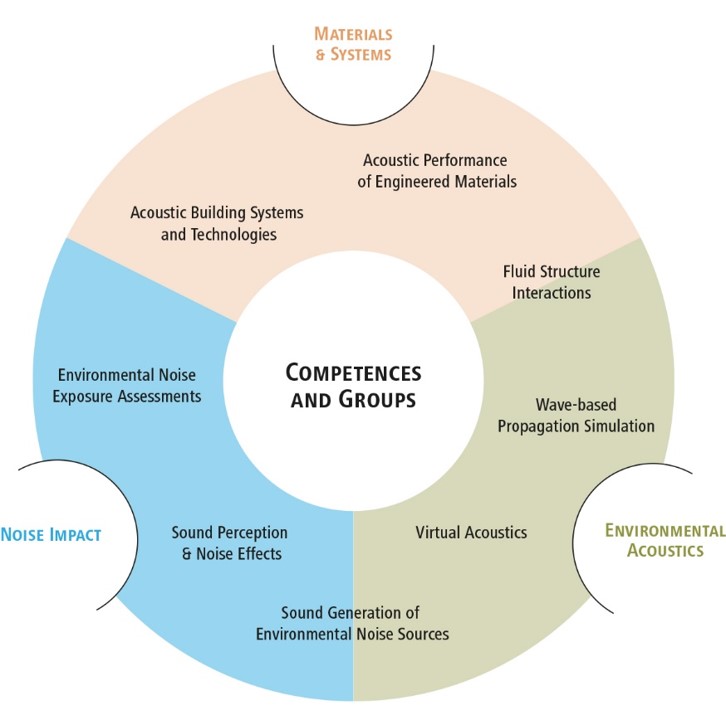Laboratory for Acoustics / Noise Control
Mission
Noise is one of the major environmental issues, and the built environment often lacks sufficient acoustic comfort. Noise substantially affects health, wellbeing and performance. It is therefore our mission to investigate and understand the mechanisms of vibration and sound generation, the propagation of sound waves, as well as the effects of noise on the population. On this basis, together with our industrial and academic partners, we develop materials and technologies for noise control, and acoustic models and tools for noise impact assessment. Further, we support the governmental agencies with science-based solutions for legal noise abatement.
Strategy
Environmental noise is a major environmental pollutant with adverse health effects. Increasing population density, compact building and high demands on mobility challenge noise control in urban environments. The focus of our activities lies on challenging noise problems of transportation systems and the built environment. We develop materials and systems with tailored vibro-acoustic properties and we apply our modelling capabilities to entire urban environments, explore the impact of noise on human beings and contribute to noise mitigation technologies. We thereby follow a deeply interdisciplinary approach allowing us to bridge the understanding of the foundations of wave transport in structured media, as known from solid-state physics, to technological aspects of building physics and transportation systems to the physiology of noise perception and its effect on the wellbeing of the inhabitants of the urban environment. To cover this wide range of topics, we are organized in three intensively interacting, strongly interlinked groups:
Materials & Systems
We carry out investigations of dynamics of materials and structures. The understanding and optimization of sound propagation in solids offers the opportunity to implement noise abatement at its origin and to improve the acoustic environment that surrounds us. Modifying the behavior of mechanical waves in solids or the interaction at the interface between solids and fluids can contribute to the wellbeing of users and improves the performance of systems exposed to the effect of acoustic or mechanical waves. Our work is motivated by tangible engineering needs and guided by mechanics and physics.
Environmental Acoustics
We focus on the three major technical noise sources of the urban environment, namely, road, rail and air traffic. Sound propagation in the outdoor urban space is a challenge since it features the combination of true 3D geometries, different surface materials and structured facades. To design and assess the urban space acoustically, we develop performant hybrid engineering models and wave-based propagation models, which closely reflect the physical mechanisms of sound generation. For wave-based numerical computations, we make use of high performance computing. For larger investigation areas like whole neighborhoods, experimental methods are employed like scale model measurements in our semi-anechoic laboratory.
Noise impact
We conduct large-scale environmental noise exposure assessments with the goal of quantifying the noise impact on the population level. Further, we perform psychoacoustic studies to contribute to a detailed understanding of the human reaction to sound and collaborate in field studies to shed light to the impact of noise on humans on a larger scale. With these activities, we contribute to the legal basis of noise abatement and we help to promote better sound environments for an improved quality of life.


Dr. Andrea Bergamini
Head of Group Materials & Systems




